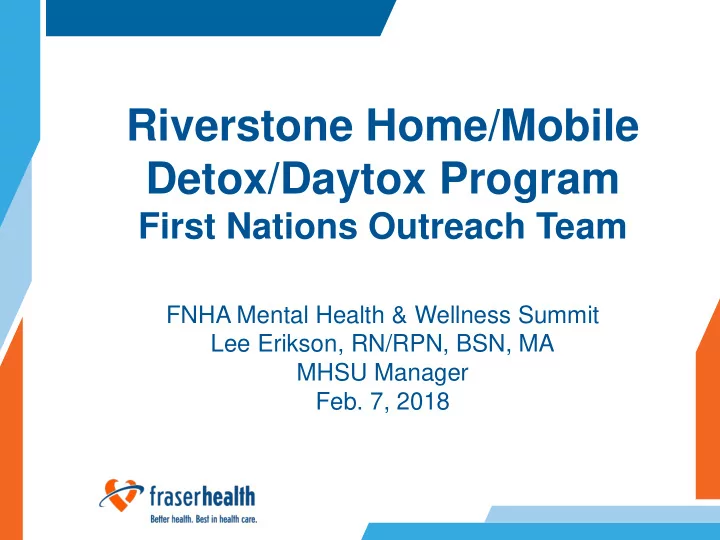

Riverstone Home/Mobile Detox/Daytox Program First Nations Outreach Team FNHA Mental Health & Wellness Summit Lee Erikson, RN/RPN, BSN, MA MHSU Manager Feb. 7, 2018
Riverstone Home/Mobile Detox/Daytox Program • Operating since mid 2010 • Located at Chilliwack General Hospital • Delivers mobile detox services to clients living in east Fraser Valley communities including Mission, Abbotsford, Agassiz- Harrison, Chilliwack, Hope, Boston Bar
Home/Mobile Detox Model • Delivery of detox services in person’s home community • Harm reduction approach involving family and community • Sites vary, e.g. home, family member’s home, or S.T.A.R. beds if individuals do not have safe homes or a full time caregiver to provide support and monitoring during acute detox
S.T.A.R. beds • Short Transitional Access to Recovery beds • Agreements in place with provincially licensed community based facilities to undergo acute detoxification (5-8 day average) • Eligible to stay for an additional up-to-30 days stabilization period • Opportunity to arrange for residential treatment and other post-detox care while waiting in a safe and drug free environment
Program Admission • Self referrals, ER depts, family physicians, mental health centres, inpatient units • Creekside Medical detox in Surrey if withdrawal too severe for Riverstone home/mobile program
Transportation • Important aspect of providing services • Outreach staff can transport clients to intake appointments with addiction physicians in Chilliwack, Mission, Abbotsford, and Seabird Island clinic locations • Agreement in place with Community Driver agency
Medical Monitoring • Ongoing assessment and monitoring of physical and psychosocial condition is critical in home/mobile detox model • Physician oversight is imperative to determine if client is safe to detox in a home in community, and for prescription of medications, methadone, or suboxone
How it works • An RN/RPN accompanied by a Health Care Assistant visit each client daily during primary detox period (5-8 days) • Assess physical condition and presence of withdrawal symptoms; administer medications • Support wellness practices and comfort measures; assist with aftercare and referrals • Educate support person in the home who stays with client between Riverstone visits
Outcomes/Benefits • Average 400 clients admitted per year • 22-25% are Aboriginal people mainly off reserve • Family and partners can be involved in the process • Services more private and better fit for each unique client • Less stigma and labelling • Improved access to MHSU services
First Nations Outreach Model • Expansion of Riverstone to more specifically serve the FN communities from Mission/Abbotsford, Chilliwack, to Agassiz, Hope, both sides of the Fraser River up to Boston Bar. • FNHA-funded dedicated FN Outreach Team added to Riverstone May 2015 • consists of one RN/RPN accompanied by a Clinical Counsellor/SW seven days per week
Community Engagement • Invitations to meet and listen to family members, elders and community leaders in the communities • Attending ceremonies and events in communities • Providing health talks about addiction, detox, relapse prevention, harm reduction, Take Home Naloxone • Learning history and culture of each community, and asking questions about how Riverstone can adapt to support members ready to detox
FN Home/Mobile Detox opportunities • There has been an increase in numbers of clients of Aboriginal heritage referring to Riverstone from many of these FN communities • In the last 6-9 months there have been several clients able to detox in their home community in addition to using the S.T.A.R. bed option at Kinghaven or Firth agencies.
After Care Connections • Partnering with community leaders, health care providers, families within the FN Communities • allows the Riverstone team to reach out and help with post-detox planning and follow up support
Stories about Connections Aligning with the different cultural perspectives of healing and wellness … .
Questions?
Recommend
More recommend